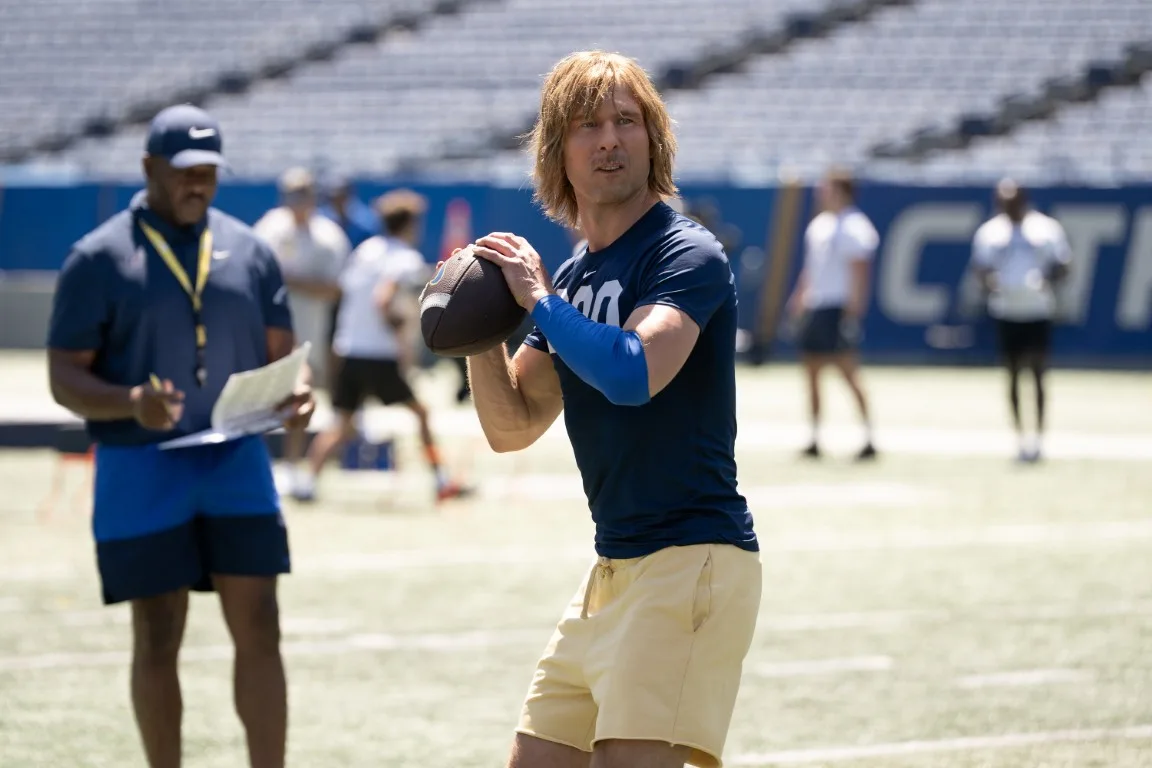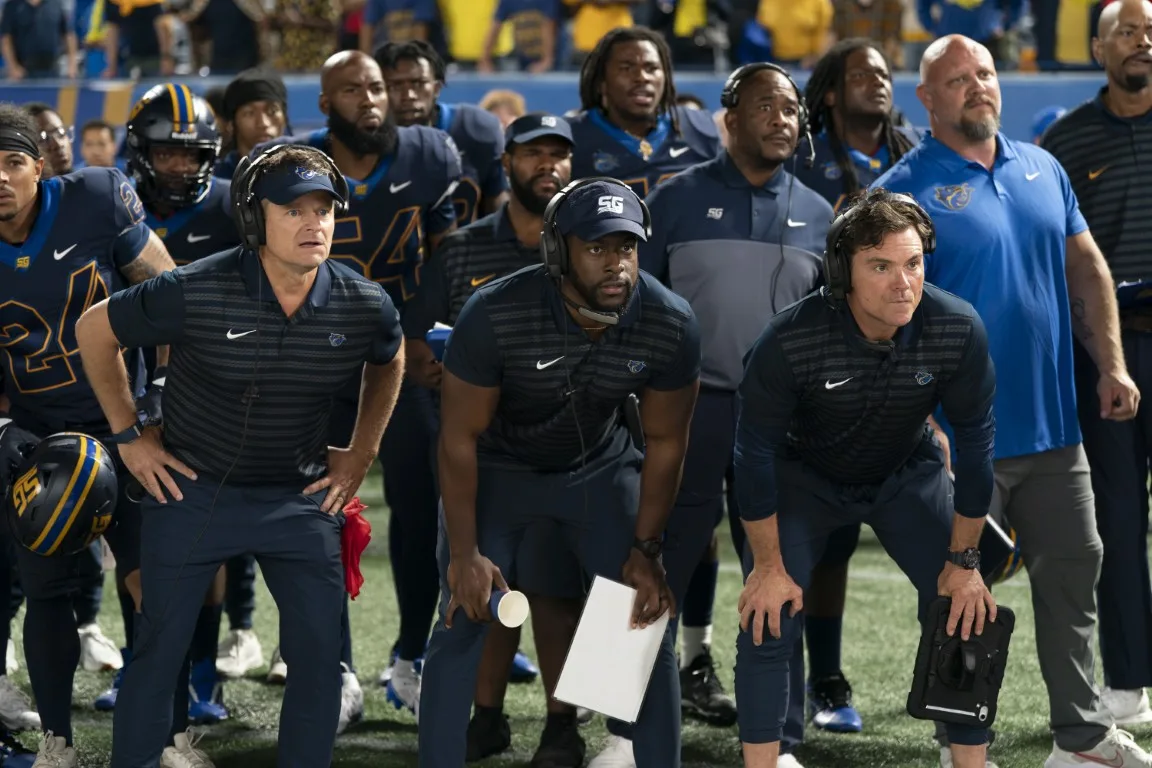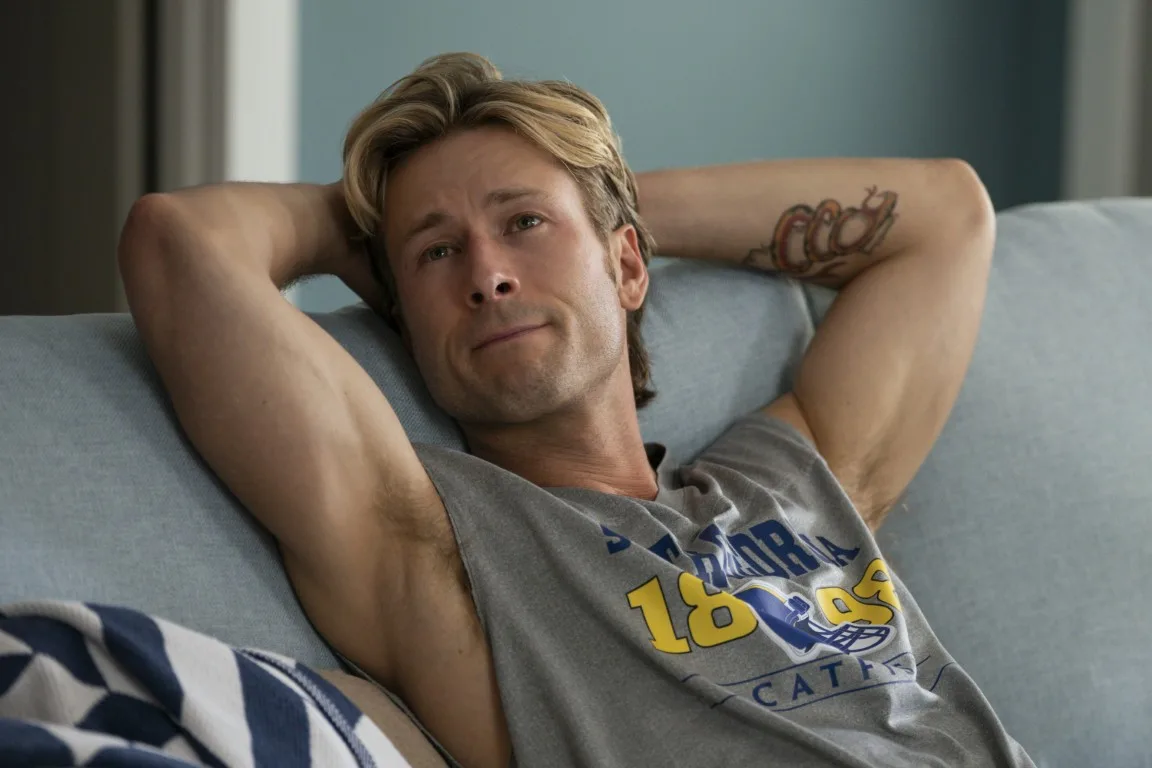The new Hulu series “Chad Powers” combines the “over-the-hill athlete makes a comeback” movie and the “person wears prosthetic makeup to pretend to be somebody else” movie. It’s not a combination that has been attempted before, to my knowledge, and when you watch even one episode, you’ll understand why.
Glen Powell, who also executive-produced, plays Russ Holliday, a gifted college quarterback whose career ends after he makes a catastrophic error that causes his team to lose the Rose Bowl, then behaves abominably on national television.
Nobody anywhere in football will hire Russ after that. He ends up living with his dad Mike (Toby Huss), a Hollywood makeup artist who, we’re told, is “doing the new Davy Crockett movie for Michael Bay.” He’s in denial about why, exactly, his life is a shambles. He tried to reinvent himself by appearing as a guest on “The Masked Singer” and getting involved in crypto, but it didn’t amount to anything. Another character jokes that Russ is less popular than Osama bin Laden. When people recognize him in public, they look away or pretend not to know who he is. Russ hates himself so much that he uses one of his trophies to open a bottle of beer, but not so much that he’s ready to recognize and name the true source of his misfortune, that guy in the mirror.

Then Russ hears that the struggling (and nonexistent) South Georgia Catfish are trying to reverse their downward trajectory by holding open tryouts for a new quarterback. Russ and his new buddy Danny, the team’s mascot, use prosthetic makeup effects to create a previously nonexistent new person, Chad Powers, to suit up and try out. One of the many showbiz in-jokes in this series is that Powell, who has often been compared to his fellow Texan Matthew McConaughey, looks kinda like McConaughey’s character Wooderson in “Dazed and Confused” when he’s in his Chad Powers disguise, and sounds like Wooderson on helium.
Of course, Chad, being Russ, demonstrates extraordinary skill and is named quarterback. This is later downgraded to backup quarterback, because the upbeat, pious young man who previously held that position, Gerry Dougan (Colton Ryan), is a known quantity, and the head coach Jake Hudson (Steve Zahn) wants to see how Chad does in a real game.
What follows is an imposter narrative in which characters participating in a deception adjust to new problems to keep the ruse going. Danny and Russ have to constantly redo and refine the Chad Powers makeup so that it’ll stay on when it’s hotter than blazes and everyone’s sweating; when the new guy gets knocked around on the field; or when he’s expected to get in the shower or a swimming pool like everybody else on the team. They also have to find a way to satisfy the demand for press access without offering any checkable facts. Russ’s original inspiration for Chad was “Mrs. Doubtfire,” and like Robin Williams’ adorable old English nanny in that movie, Chad is vague and a bit surreal when answering questions about his past, saying cryptic things like, “I grew up off the grid, where the crawdads are.”
In the grand tradition of sports movie tropes, “Chad Powers” also has an assistant coach who has great ideas but isn’t listened to because of a low position in the pecking order, and a coach’s daughter who clicks with the new guy, who becomes smitten with her and gives her emotional support she can’t get from anyone else. These characters are combined in the form of Ricky Hudson (Perry Matfield), a tall, beautiful ex-track star who threw herself on her father’s mercy after her career prematurely ended. This isn’t the only parallel between Russ and Ricky’s personal histories. The most obvious one is that they both want unconditional love from their fathers, who are decent people but undemonstrative. (When Russ calls Mike after having disappeared for six weeks, Mike tells him cooly, “I hope you’re OK. But at some point, forgiveness runs out.”)

There’s a moment in the second episode where Russ contemplates the ridiculous situation he’s gotten himself into and says, “F—, this could be a movie!” It feels like a preemptive defense against a criticism that a lot of people make about series in the streaming era, but it’s a valid one in the case of “Chad Powers.”
Although the details are, of course, different—including the choice of sport—there are lots of similarities with the first breakthrough Apple+ series, “Ted Lasso,” including a beautiful, assertive forty-something blond woman in a position of authority who clashes with the coach (in this case, Wynn Everett’s Tricia, the influential new head of the boosters’ organization); various, rather stereotypical teammates whose trust Chad/Russ has to win; and a “road” episode where the challenge is to sneak out, have fun in town, and get back to the hotel before curfew. It’s also a comedy-drama that was spun off from a jokey sports cable character: where the Ted Lasso character debuted in promos for NBC’s 2013 coverage of the Premier League, Powell and series co-creator Michael Waldron (“Rick & Morty,” “Heels”) imported Chad Powers from the EPSN+ series “Eli’s Places,” where host Eli Manning, the former New York Giants QB, donned a version of the Chad Powers prosthetics to pretend to be a too-old walk-on tryouts candidate for Penn State.
And, yeah, it’s a redemption story. That shouldn’t be a drag on the show, because pretty much every sports story is to some degree a redemption narrative, whether it’s about a loser (or a losing team) trying to become winners, a la “Rocky” or “Rudy,” or something deeper, like the McConaughey star vehicle “We Are Marshall,” about a college trying to rebuild a football program that was wiped out in a plane crash.
The stakes here are minor in comparison, but while the series obviously realizes this, it nevertheless wants us to care very, very much about Russ’s transformation from a man who’s hated with good reason to one who richly deserves the adoration he receives. Which is to say that it’s about how pretending to be a better person can eventually turn you into one, if you just stick with it—and yeah, the show is upfront about recognizing this aspect, too. It’s quite self-aware in that way, often annoyingly so.
The most irritating aspect of “Chad Powers” isn’t Powell’s rather too self-satisfied “transformation” into the title character, which is never quite believable because they have the same distinctive eye shape; nor is it the constant echoes of “Ted Lasso” and the many elements of the sports film that have been plunked down but not sufficiently rethought. It’s that there’s a far more compelling show happening in the scenes with Ricky and/or Jake Hudson. This is a father-daughter dynamic we haven’t been shown in a TV series before, at least not quite in this way.
Ricky’s character seems woefully underwritten at first, but after three episodes we start to realize that she’s just wounded and introverted, and is being played more subtly than most of the other characters. Ricky gains depth as season one moves towards its finale. I’ve known many women like Ricky, dedicated and knowledgable sports fans struggling for acceptance in a male-dominated sphere. And I’ve known many fathers and daughters with Ricky and Jake’s dynamic—the kind where, if the father gave the daughter a birthday gift of a ball autographed by her favorite player, she’d be more excited than if he’d given her Taylor Swift tickets. Mattfield and Zahn capture this kind of relationship beautifully. They’re both superb, especially when the characters drop their guards and the force of their suppressed feelings catches them by surprise. Sometimes they’re overwhelmed. I cared far more about both of them than I did the handsome, gifted but awful young man who had the world by the tail, let it go, and devised a complicated deception to get it back.
Whole season screened for review. Now on Hulu.












